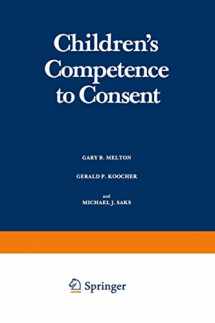
Children’s Competence to Consent (Critical Issues in Social Justice)
Book details
Summary
Description
1 Children''s Competence to Consent: A Problem in Law and Social Science.- Changes in Children''s Legal Status.- The Court''s Assumptions about Minors'' Competence.- Abortion Cases Concerning Minors.- Conclusions.- Problems in Application of Developmental Research.- What Do We Know'.- A Final Note: The Need for Clear Policy.- References.- I: Psychological Issues in Increasing Children''s Self-Determination.- 2 Decision Making by Children: Psychological Risks and Benefits.- The Nature of Freedom.- Psychological Effects.- Legal Socialization.- Reactance and Power.- Performance.- Privacy.- Some Questions.- A Practical Irony.- References.- 3 Social Psychological Perspectives on the Problem of Consent.- What is Social Psychology'.- The Contribution of Social Psychological Findings and Theories to Consent Issues.- Illustrations.- Preparing a Patient for Granting Consent.- Making Decisions for Minors.- Manipulating Attributions of Responsibility.- Are Children Competent to Consent'.- Research and Applications.- References.- II: Children''s Consent to Treatment: Legal, Medical, and Psychological Perspectives.- 4 Consent to Medical Care for Minors: The Legal Framework.- The Tort Law Background.- The Basic Requirement of Consent.- The Mature Minor Doctrine.- Some Specific Statutory Approaches.- The Doctrine of "Informed Consent".- Consent and Financial Responsibility.- Parental Consent to Medical Procedures Not for the Minor''s Primary Benefit.- Special Problems of Mental or Emotional Disorders of Children.- Parental Consent Overruling Child.- The Supreme Court and Abortion.- Conclusion.- 5 Decision Making Related to Health: When Could/Should Children Act Responsibly'.- Children''s Health-Related Beliefs and Behaviors.- Involving Children in Decision Making.- Informed Consent by Children.- Informed Consent by Question and Answer.- Differences by Age and Sex.- Child-Initiated Care in Public Schools.- Teaching Decision Making to Children.- Actions for Health.- Development of Specific Lessons Unit by Unit.- When Can/Should Children Decide'.- Research.- Summary.- References.- 6 Informed Consent and Pediatric Care.- Issues in the Pediatric Patient''s Ability to Consent.- Limited Information and Legal Requirements.- Vulnerability of the Child.- Limited Cognitive and Social Development.- The Medical Setting and Changing Physician Relations.- Obtaining Consent for Different Medical Conditions.- The True Emergency.- The Impending Emergency.- Nonemergencies.- Chronic Diseases.- Other Conditions.- Physician-Child-Family Relationship.- Research.- Conclusion.- References.- 7 Competence to Consent: Psychotherapy.- Enrolling in Psychotherapy.- Socialization in Childhood.- Role of the Child-Client.- Confidentiality.- Involuntary or Restrictive Treatment.- The Doubly Incompetent.- Children''s Understanding of Psychotherapy.- Minors'' Competence in General Treatment.- Case Examples.- Case Commentaries.- Realistic Alternatives.- Researchable Questions.- References.- III: Children''s Consent in Nonmedical Areas.- 8 Juveniles'' Consent in Delinquency Proceedings.- Legal Background.- The Social Context of Rights Waiver.- Review.- Research Recommendations.- Applied Recommendations.- Juveniles'' Capacitie s to Understand Their Rights.- Review.- Research Recommendations.- Applied Recommendations.- Juveniles'' Responses to Legal Advocates.- Review.- Research Recommendations.- Applied Recommendations.- What''s the Use'.- References.- 9 Children as Participants in Psychoeducational Assessment.- Consent and Competency.- Legal Regulation of Consent to Psychoeducational Assessment.- The Federal Government''s Perspective.- One Judicial Perspective.- The Developing Law of Children''s Right to Independent Decision Making.- Involving Children in Consent to Psychoeducational Assessment.- Guidelines and Goals for Future Research.- References.- 10 Children and Consent to Participate in Research.- Historical Background.- Functions and Requirements of Consent to Participate in Research...- Proxy Consent and Parental Competence.- Information Offered Participants.- Capacity.- Voluntariness.- Attracting Consent.- Right to Withdraw.- Anticipated Benefit.- Potential Risk.- Deception.- Competence of Investigators.- Researchable Questions.- Concluding Remarks.- References.- IV: Implementing Consent Standards.- 11 Preparing Children for Decision Making: Implications of Legal Socialization Research.- The Relevance of Legal Socialization Research.- Cognitive Theory of Legality.- Results: Cross-Cultural, Developmental, Occupational, and Situational.- An Empirical Example.- Implications of the Developmental Findings.- Principles of Legal Education.- References.- Appendix: Tapp-Levine Rule Law Interview.- 12 Involving Children in Decisions Affecting Their Own Welfare: Guidelines for Professionals.- Why Involve Children in Decisions Affecting Their Own Welfare'.- Factors Related to Children''s Involvement in Decisions Affecting Their Own Welfare.- Allocations of Decision-Making Power.- The Capacity of Minors to Exercise Decisional Autonomy.- Risk/Benefit Ratios and Specific Decision-Making Contexts.....- The Minor''s Desired Involvement.- Models for Involving Children in Decisions Affecting Their Own Welfare.- Self-Determination.- Joint Decision Making.- Proxy Consent.- Collaboration by Child and Practioner within the Professional Relationship.- Access to Information.- Conclusions.- References.- Author Index.


We would LOVE it if you could help us and other readers by reviewing the book
Book review



